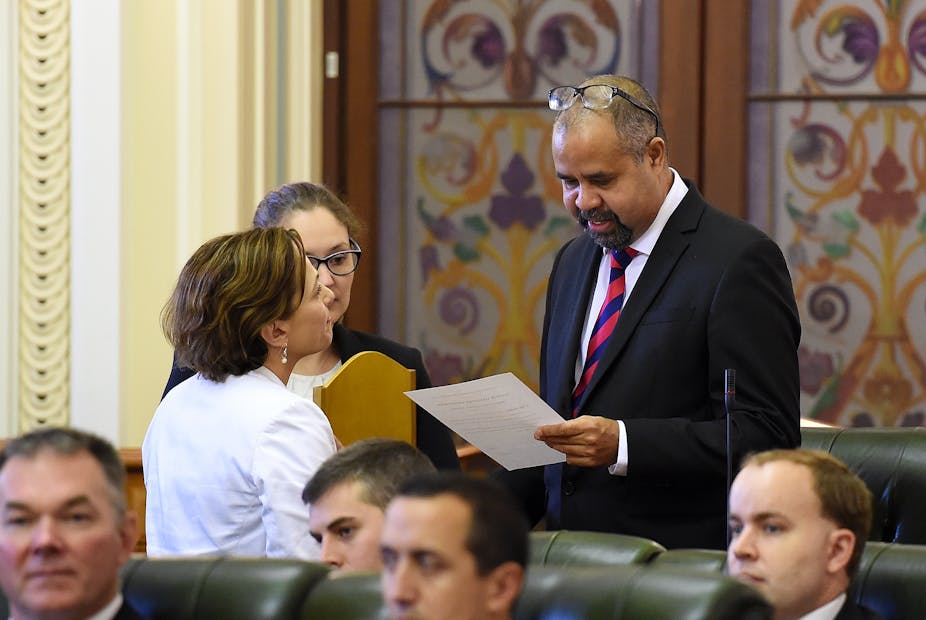Queensland’s new Labor government is being confronted with its first crisis. It not only places doubt over the government’s tenuous majority, but it goes to the heart of its credibility. The government’s survival is at stake just two months after it was elected.
At a press conference on Sunday, Premier Annastasia Palaszczuk sacked MP Billy Gordon from the parliamentary Labor Party and called on him to resign his seat. His resignation from parliament would trigger a byelection, which, if won by the Liberal National Party, would give Labor and the LNP 43 seats each in the 89-seat Legislative Assembly.
Gordon, the member for the north Queensland seat of Cook, had failed to disclose his criminal history, including that an apprehended violence order was issued against him after a complaint by his mother in 2008.
On Friday, Palaszczuk referred an allegation that Gordon was involved in an incident of domestic violence to Queensland police commissioner Ian Stewart. Gordon also admitted that he had failed to pay child support to his former partner.
Gordon has apologised for not notifying Palaszczuk of his criminal record. But this has clearly not been enough to save his party membership and looks likely to end his fledgling political career.
At the time of publishing, Gordon had not publicly responded to the premier’s actions.
Palaszczuk’s first big test
Throughout her press conference, Palaszczuk used strong language to criticise Gordon’s criminal actions and his failure to notify ALP officials of his criminal history when he ran for preselection. She said:
The member for Cook was dishonest with me. He has let me down, he has let my deputy down, he has let my team down and he has let the people of Queensland down.
Gordon’s failure to notify party officials during preselection is particularly noteworthy given that he has run as a Labor candidate before. In 2013, he unsuccessfully stood for the ALP in the federal seat of Leichhardt.
Palaszczuk called on ALP head office to reform its preselection practices. She said that if the party had known of Gordon’s criminal history during the preselection process, he would never have been a Labor candidate.
A fast-moving story
In calling for Gordon’s resignation from parliament and sacking him from the parliamentary party, Palaszczuk did what was required of her in the short term given the events of the past 48 hours.
On Sunday, Queensland speaker and independent MP Peter Wellington said that Gordon should step down as a member of parliament, and a byelection should be called. This would place the Labor government in a perilous situation given that it relies on Wellington’s support to stay in power.
Wellington’s call came on the back of the Sunday Mail newspaper claiming that it has:
… obtained correspondence sent to the premier on March 13 – two weeks before the police referral in relation to claims made by Gordon’s former partner.
This could potentially give some weight to Opposition Leader Lawrence Springborg’s assertion that the Palaszczuk had covered up the allegations against Gordon.

Palaszczuk’s promises and potential implications
Palaszczuk made integrity, honesty and transparency a central theme throughout January’s state election campaign. She used this strategy to highlight Campbell Newman’s lack of support for Queensland’s anti-corruption watchdog, the Crime and Corruption Commission, and suggested that her government would be more accountable to the electorate.
Integrity was also the central theme that Palaszczuk kept returning to on Sunday. In doing so, she framed her handling of this issue as a debate on her own leadership abilities, by constantly referring to the government’s response in personal, emotive language:
I have always maintained integrity is fundamental to any government I lead … I am prepared to put my premiership on the line.
And by saying that she “felt sick to the stomach” over Gordon’s actions, Palaczszuk shifted the spotlight away from Gordon’s past, or Labor’s apparent failure to do its due diligence on its candidates, and placed it firmly on the government’s moral character.
Such language might be easy to use in a press conference, but Palaszczuk’s stance has political implications well beyond the next media cycle. When asked if she would accept Gordon’s vote should he become an independent MP critical to the government’s survival, Palaszczuk refused to answer. She knows that any potential answer could destroy her government.
The ALP clearly does not want to support an independent MP who was so harshly condemned by its leader today. However, it also does not want to face the prospect of losing a byelection that could bring down the government.
If an LNP candidate wins a future contest in the seat of Cook it will drastically alter the dynamics of the Queensland parliament. It would almost certainly tilt the balance in the LNP’s favour. While Wellington would notionally support the ALP, what the two Katter’s Australian Party (KAP) MPs would do remains uncertain.
While they have previously indicated their wish to support Springborg, KAP MP Rob Katter said on Sunday that his party doesn’t “want to be in the business of tearing down governments”.
While Palaszczuk has rightly taken a strong position against Gordon, her next task is to ensure actions speak louder than words – even if it jeopardises her government’s survival.

